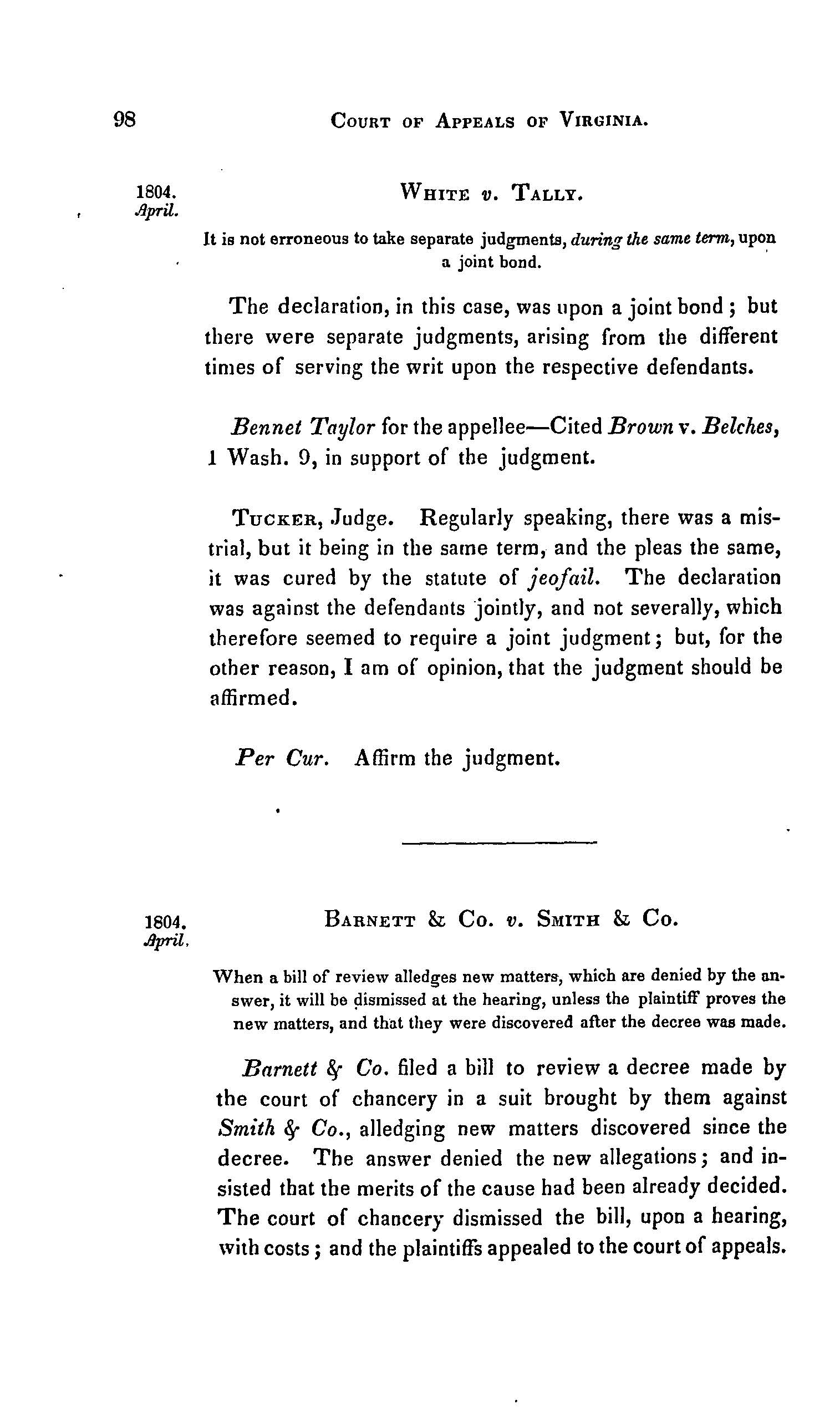Difference between revisions of "Barnett & Co. v. Smith & Co."
m |
|||
| Line 1: | Line 1: | ||
{{DISPLAYTITLE:''Barnett & Co. v. Smith & Co.''}} | {{DISPLAYTITLE:''Barnett & Co. v. Smith & Co.''}} | ||
| − | [[File:CallBarnett&CovSmith&Co1833v5p98.jpg|link= | + | [[File:CallBarnett&CovSmith&Co1833v5p98.jpg|link={{file path:CallsReports1833V4Barnett&CovSmith&Co.pdf}}|thumb|right|300px|First page of the opinion [[Media:CallsReports1833V4Barnett&CovSmith&Co.pdf|''Barnett & Co. v. Smith & Co.'']], in ''Reports of Cases Argued and Decided in the Court of Appeals'', by Daniel Call. Richmond: R. I. Smith, 1833.]] |
__NOTOC__ | __NOTOC__ | ||
| − | [[Media:CallsReports1833V4Barnett&CovSmith&Co.pdf|''Barnett & Co. v. Smith & Co.'']], Call | + | [[Media:CallsReports1833V4Barnett&CovSmith&Co.pdf|''Barnett & Co. v. Smith & Co.'']], 9 Va. (5 Call) 98 (1804),<ref>Daniel Call, ''Reports of Cases Argued and Adjudged in the Court of Appeals in Virginia'', (Richmond: R. I. Smith, 1833), 98. George Wythe owned the [[Reports of Cases Argued and Adjudged in the Court of Appeals of Virginia|first edition]] of this set.</ref> was a case involving whether new matters, discovered after a judgment, are admissible on appeal. |
==Background== | ==Background== | ||
| Line 8: | Line 8: | ||
===The Court's Decision=== | ===The Court's Decision=== | ||
| − | Chancellor Wythe dismissed the case with costs. The Court of Appeals determined there were instances when new allegations could be heard on appeal, but the Court ultimately affirmed the Chancellor’s decision. | + | [[George Wythe|Chancellor Wythe]] dismissed the case with costs. The Court of Appeals determined there were instances when new allegations could be heard on appeal, but the Court ultimately affirmed the Chancellor’s decision. |
Affirming the Chancery Court's decision, Chief Justice Lyons briefly describes George Wythe's judicial inclinations stating "[t]he chancellor is probably not so strict, as they are in England, with respect to the ground upon which he grants leave to file bills of review: and therefore the same rigour ought not, perhaps, to prevail in the reconsideration of them by this court. However, in the present case, the decrees are right upon the merits." | Affirming the Chancery Court's decision, Chief Justice Lyons briefly describes George Wythe's judicial inclinations stating "[t]he chancellor is probably not so strict, as they are in England, with respect to the ground upon which he grants leave to file bills of review: and therefore the same rigour ought not, perhaps, to prevail in the reconsideration of them by this court. However, in the present case, the decrees are right upon the merits." | ||
| Line 17: | Line 17: | ||
==References== | ==References== | ||
<references/> | <references/> | ||
| − | |||
| − | |||
[[Category: Cases]] | [[Category: Cases]] | ||
Revision as of 11:46, 10 March 2018

Barnett & Co. v. Smith & Co., 9 Va. (5 Call) 98 (1804),[1] was a case involving whether new matters, discovered after a judgment, are admissible on appeal.
Background
Barnett & Co. filed an appeal in the High Court of Chancery regarding a suit brought by Smith & Co. The petition alleged, among other things, that new matters were discovered concerning the original case after a judgment was already decided by the Court. Smith & Co. denied the new allegations in their answer and argued that the merits of the case had already been decided.
The Court's Decision
Chancellor Wythe dismissed the case with costs. The Court of Appeals determined there were instances when new allegations could be heard on appeal, but the Court ultimately affirmed the Chancellor’s decision.
Affirming the Chancery Court's decision, Chief Justice Lyons briefly describes George Wythe's judicial inclinations stating "[t]he chancellor is probably not so strict, as they are in England, with respect to the ground upon which he grants leave to file bills of review: and therefore the same rigour ought not, perhaps, to prevail in the reconsideration of them by this court. However, in the present case, the decrees are right upon the merits."
See also
References
- ↑ Daniel Call, Reports of Cases Argued and Adjudged in the Court of Appeals in Virginia, (Richmond: R. I. Smith, 1833), 98. George Wythe owned the first edition of this set.